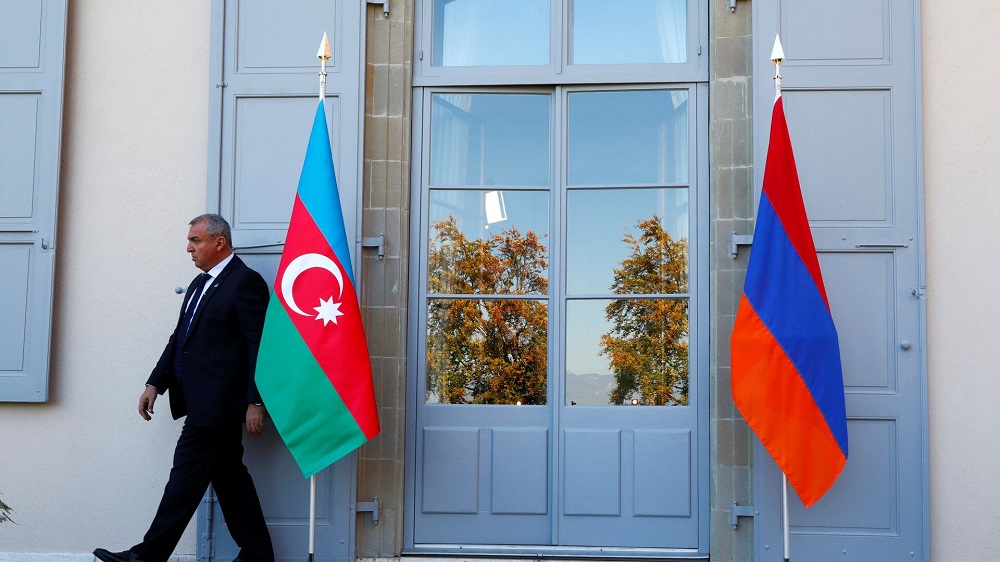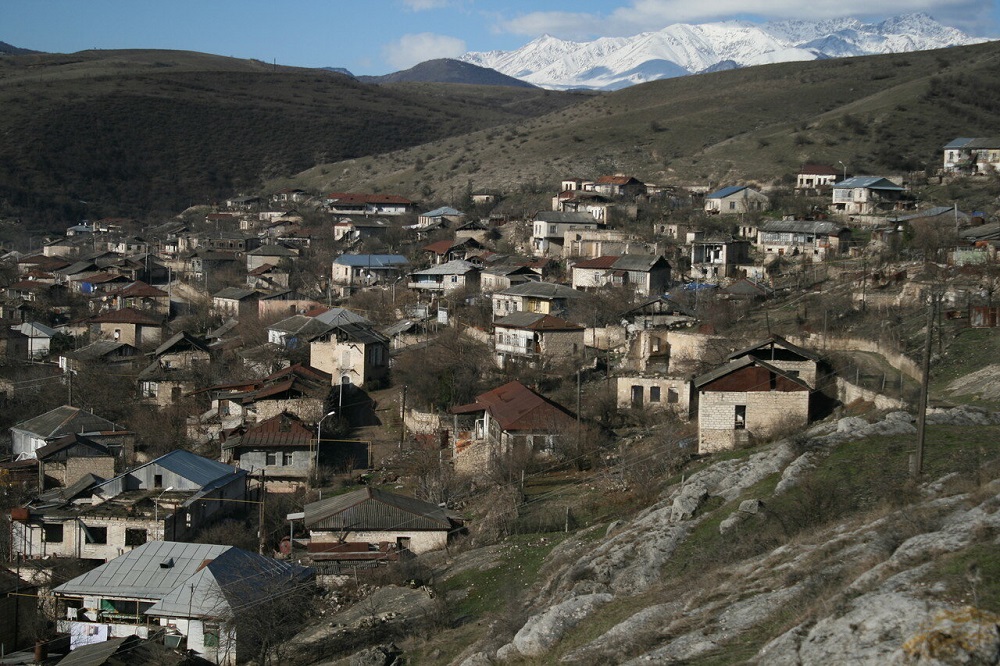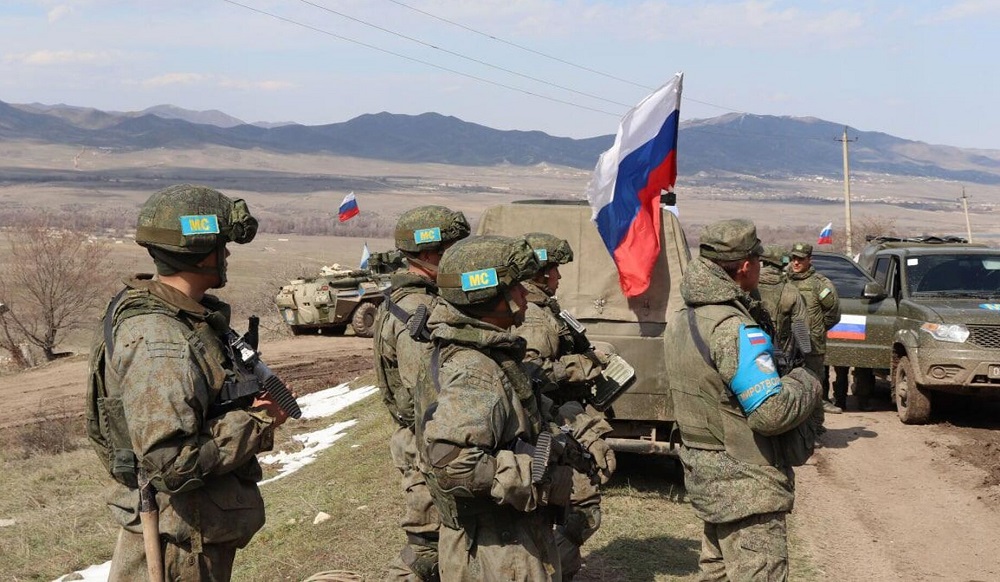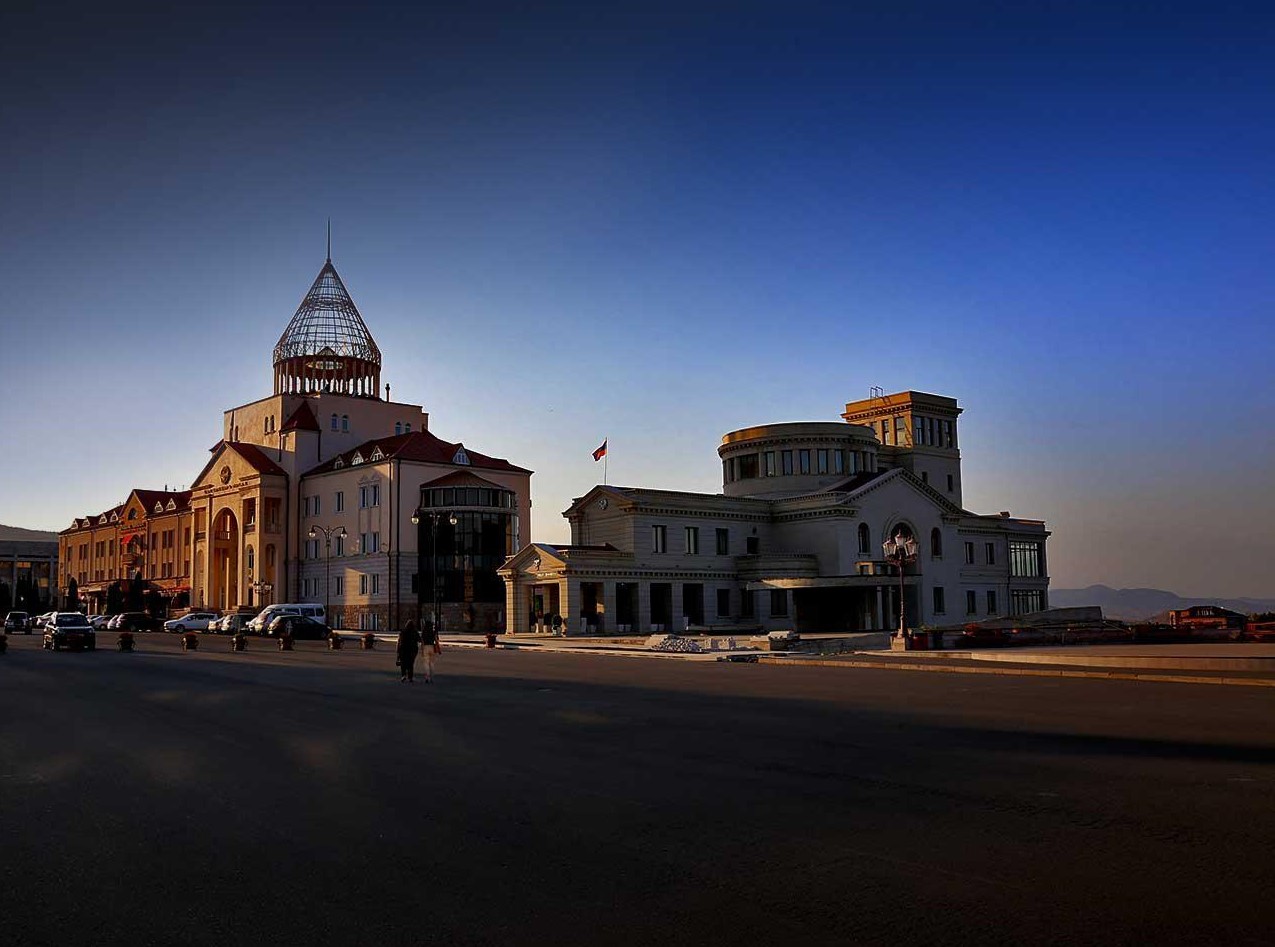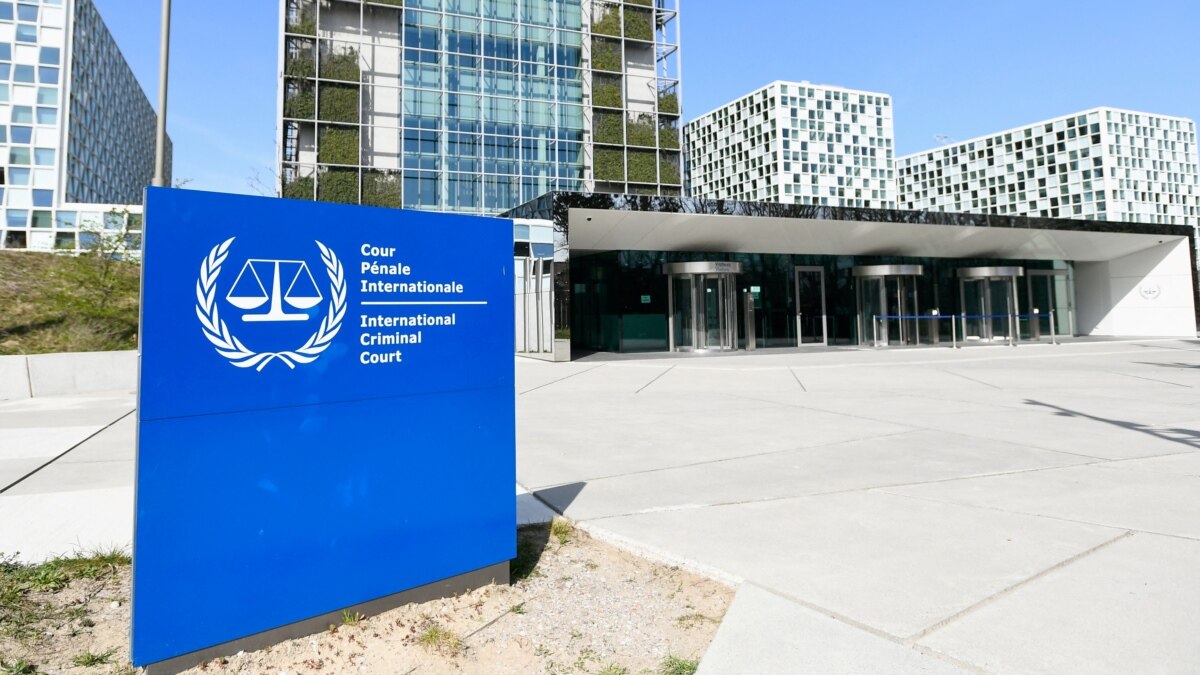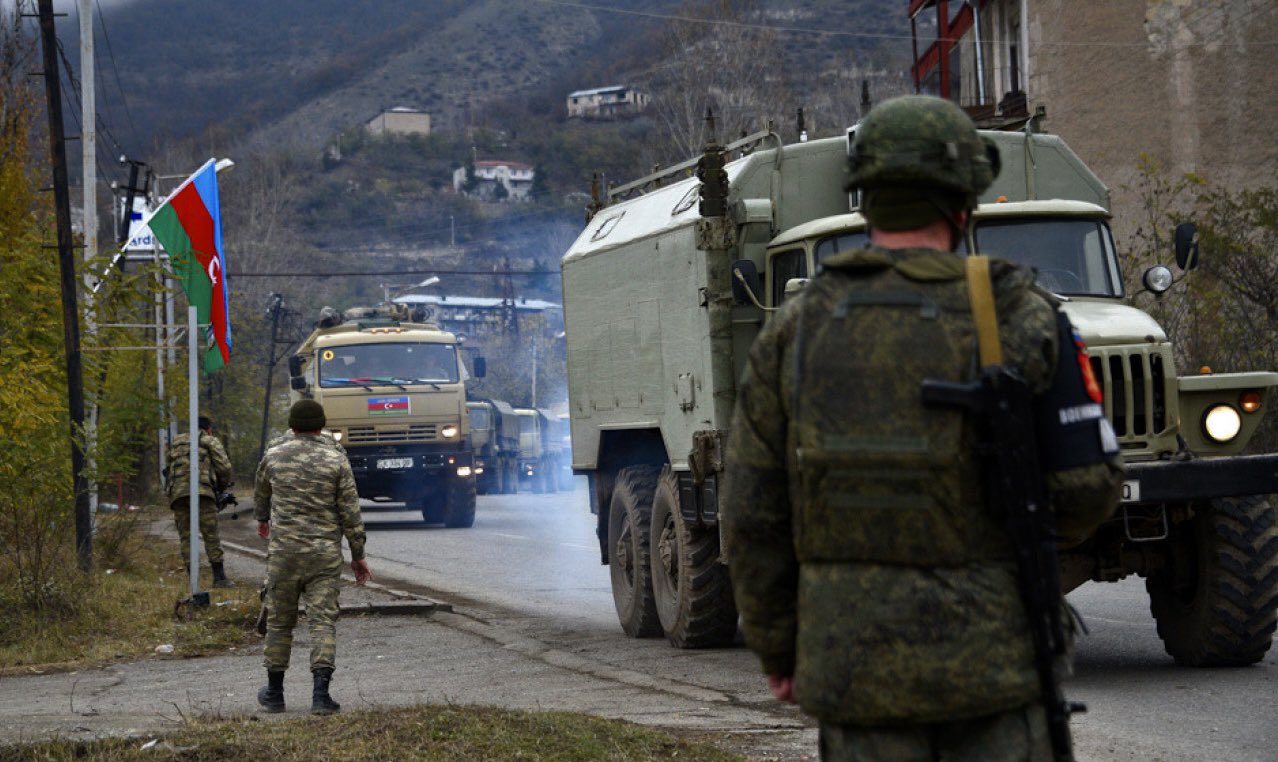Azerbaijan installs checkpoint at entrance to Lachin road. Information and comments from Baku and Yerevan
Checkpoint on the Lachin road
The Azerbaijani Border Service announced the installation of a checkpoint on the border with Armenia at the entrance to the Lachin road. The Azerbaijani Foreign Ministry states that there will be no obstacles to movement along the corridor to Armenians living in Karabakh. In Yerevan and Khankendi (Stepanakert), this was viewed as a gross violation of the requirements of the agreement of November 10, 2020.
- Is Armenia ready to recognize the Treaty of Kars? Comments
- “It is necessary to change the realities “on the ground”. View from Baku
- How children with achondroplasia, a rare genetic disease, live in Georgia
Information from Baku
“In order to prevent the illegal transfer of manpower, ammunition, mines, and other military equipment from Armenia to the Armenian armed formations on the territory of Azerbaijan, carried out contrary to the tripartite statement of November 10, 2020, and the establishment by Armenia unilaterally of a border checkpoint on at the entrance to the Lachin-Khankendi road on the border with Azerbaijan on April 22, at 12:00 on April 23, divisions of the State Border Service of the Republic of Azerbaijan on the sovereign territories of our country on the border with Armenia at the beginning of the Lachin-Khankendi road, a border checkpoint was established,” a service statement reads.
It notes that the Russian peacekeeping contingent and the Russian-Turkish monitoring center in Karabakh were informed about this.
Statement of the Ministry of Foreign Affairs of Azerbaijan
The Foreign Ministry of Azerbaijan rationalized the move “by the ongoing systematic and large-scale use of the Lachin-Khankendi road by Armenia for illegal purposes.”
“For two and a half years after the signing of the tripartite statement, Azerbaijan has consistently drawn attention to the illegal use of the Lachin road by Armenia. Examples of such illegal actions are the rotation of personnel of the Armenian armed forces which continue to remain on the territory of Azerbaijan, the transportation of weapons and ammunition, the transport of terrorists, and illegal export of natural resources and cultural values,” the Ministry of Internal Affairs said.
“As part of this additional measure, which is a guarantee of security on the part of the Republic of Azerbaijan for the movement of citizens, vehicles and goods along the Lachin road, the necessary conditions will be created for the transparent and orderly passage of Armenian residents living in the Karabakh region of Azerbaijan from this point to Armenia and Azerbaijan in both directions. This control mechanism will be carried out in cooperation with the Russian peacekeeping contingent,” it added.
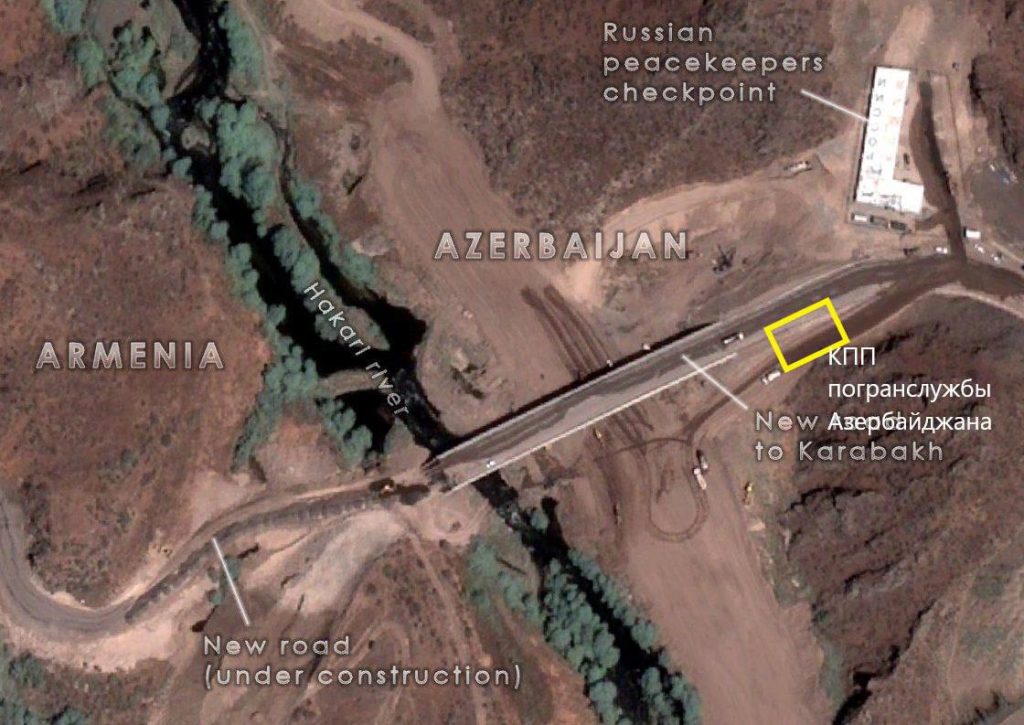
Comment from Baku
Political observer Haji Namazov commented for JAMnews about the checkpoint, according to whom there has been no violation of the tripartite agreement:
“According to the sixth paragraph of the statement dated November 10, 2020, Azerbaijan guarantees unhindered movement along the Lachin corridor. This corridor starts from the border of the two countries. Therefore, to enter it, one must enter the territory of Azerbaijan.
Checking people and vehicles entering and leaving a country is part of the sovereign rights of all countries in the world. Based on this logic, it is stupid to accuse Azerbaijan of installing a checkpoint on its own borders.”
The political scientist drew attention to another aspect of the tripartite statement signed following the second Karabakh war:
“Speaking of the sixth point of the agreement in Armenia, for some reason they forget about the ninth point, which refers to unimpeded transport between the main part of Azerbaijan and Nakhichevan.
Two and a half years have passed since the signing of the agreement. Where is this road? Not even a meter of asphalt has been laid. Who will control this road, where it will pass and I don’t even consider everything else – where is the road itself?
Azerbaijan without anyone’s help built an alternative Lachin road, which has been in use since last summer. In other words, it simply fulfilled one of the clauses of the agreement. The Armenians, continuing to assert that they will not provide an extraterritorial corridor, do nothing. Although the agreement requires the provision of a road that will be controlled by the Russian FSB. But there is no road.”
Haji Namazov also answered a question about what will change with the introduction of a checkpoint on the border with Armenia:
“This checkpoint will not change anything. Russian peacekeepers and Azerbaijani border guards are standing next to each other there. Those who live in Karabakh, humanitarian supplies, Red Cross vehicles will pass in both directions as before.
The question is what excited the Armenian side so much, and why did they suddenly start talking about a complete blockade of the illegal regime in Khankendi? The thing is that from now on it is practically impossible to transport illegal goods, as well as military personnel from Armenia to Karabakh. That’s the whole reason for this noise. Nothing has changed for civilians.”
Namazov also expressed his opinion on the protest by Azerbaijani activists on the Lachin road, which has been going on since December 12 of last year:
“The demands have not been met. No monitoring has been carried out at the fields. For this reason, the protest may continue.
But on the other hand, from now on,the illegal regime in Khankendi is deprived of the possibility of illegal transportation of minerals to Armenia. Cars with such a load simply will not be able to leave Azerbaijan. All dirt roads used by Armenians since December last year led to the bridge on the Khakari River. Based on this logic, the action may be suspended. And the monitoring of deposits is already a matter of time.”
Information from Yerevan
Armenian Foreign Ministry statement
The Armenian Foreign Ministry believes that the establishment of a checkpoint by the Azerbaijani authorities in the zone of responsibility of the Russian peacekeeping contingent finally blocks the Lachin corridor:
“This step taken by the Azerbaijani armed forces cannot even be considered as another provocation by Azerbaijan. In fact, this is a gross violation of one of the fundamental provisions of the tripartite statement of November 9, 2020, aimed at Azerbaijan’s consistent policy of ethnic cleansing in Nagorno-Karabakh and the expulsion of Armenians from NK.
The ongoing illegal blocking of the Lachin corridor since December 12 last year under a fabricated environmental pretext and the installation of a checkpoint today for far-fetched and unfounded reasons are the next steps towards the consistent implementation of this planned policy.”
The statement emphasizes that Azerbaijan has not stopped the blockade of the Lachin corridor, despite the binding decision of the International Court of Justice. On February 22, 2023, the court ordered Azerbaijan to ensure unhindered movement along the corridor.
The Armenian Foreign Ministry believes that Baku is aggravating the situation in the region, preparing the ground for a large-scale use of force. They warn that the Azerbaijani authorities are undermining the negotiation process with their actions and “continuous Armenian-hating and threatening rhetoric”.
The Armenian authorities appeal to the UN member states, endowed with a mandate of international security, “to clearly record the actions of Azerbaijan, undermining regional security.”
The last paragraph of the statement expresses dissatisfaction with the position of Russia, which is a strategic ally of Armenia:
“We call on the Russian Federation to finally fulfill its obligation under paragraph 6 of the tripartite statement by lifting the illegal blockade of the corridor and ensuring the withdrawal of Azerbaijani forces from the entire security zone of the Lachin corridor.”
Information from NK
The authorities of the unrecognized republic also issued a statement:
“Azerbaijan, once again grossly violating the points of the tripartite statement and against the backdrop of ongoing misinformation about the transfer of weapons from Armenia to Artsakh, blocked the Akari bridge on the border of Artsakh and Armenia, which is located in the zone of responsibility of the Russian peacekeeping forces, in the Lachin corridor.
Azerbaijan’s allegations about the transportation of weapons are absolutely false, because, firstly, there was no such transportation, and secondly, if the Azerbaijani side has full control over all cargo transportation carried out by peacekeepers and the Red Cross on the blocked road near Shushi, then how is such a transfer possible?
In fact, on the 133rd day of the blockade, Artsakh finds itself in a double blockade of the dictatorial regime of Aliyev: near Shusha and near the Akari bridge. This dictatorial and criminal behavior of Azerbaijan must be stopped by all responsible international actors and organizations.”
Reaction of international partners
U.S. State Department Deputy Spokesperson Vedant Patel stated:
“The United States is deeply concerned that Azerbaijan’s establishment of a checkpoint on the Lachin Corridor is undermining efforts to build confidence in the peace process. We reiterate the need for free and open movement of people and trade along the Lachin Corridor and call on the parties to resume peace talks and refrain from provocations and hostile actions along the border.”
The leader of the “Republican” faction of the French Senate, Bruno Retaio, who is in Armenia, posted a photo on Twitter before entering the Lachin corridor and wrote:
“Azerbaijani troops took control of the bridge on the Akari River, which was supposed to be guarded by Russian troops. I call on France to respond decisively. We cannot abandon Armenia to itself. We must be ready to provide Armenia with the necessary means to defend its sovereign territory.
Returning to France, we first of all must exert our influence both at the level of the President of France and at the level of the government. This time we will demand the imposition of sanctions, because we do not understand why it is possible to distinguish between the situation in Russia and Ukraine, where sanctions are applied against Russia, which encroached on the sovereign territory of Ukraine, but the same sanctions are not applied today against Azerbaijan.”
Commentary from Yerevan
Political observer Naira Hayrumyan:
“The installation of the checkpoint on the Goris-Stepanakert road is remarkable in that it takes place on the eve of the 108th anniversary of the Armenian genocide and 20 days before the elections in Turkey, which can seriously change the paradigm of regional developments, regardless of who wins the elections.
In this context, the haste of Baku’s steps should be noted, which does not even hide the fact that it does not have a temporary resource left. Despite attempts to present this as a long-planned step, it is obvious that Baku is in a hurry to prepare a reserve in case of an unfavorable outcome of the elections in Turkey.
The factor of the impending Ukrainian counteroffensive is also important, in the context of which the role and influence of Russia in the region may change. Baku, together with Moscow, is trying to hedge against the fact that, along with the change in the Ukrainian paradigm, the role of the West in the South Caucasus region will increase.
In this case, the tripartite statement of November 9 will completely lose its significance and it will be necessary to reach other agreements — no longer at the tripartite, but at the legitimate, international level.
There is also a “local” factor: the installation of a checkpoint is Baku’s unconvincing response to Armenia’s refusal to grant an extraterritorial regime to the “Zangezur corridor”. The construction of an Armenian customs point in Margara on the Armenian-Turkish border and an Armenian checkpoint near the village of Teh indicate that Armenia does not intend to provide an extraterritorial corridor.
Azerbaijani official statements indicate that the checkpoint was established in agreement with the Russian contingent. Baku emphasizes this, wittingly or unwittingly provoking the dissatisfaction of the Armenian side with Russia’s intermediary monopoly.
The Artsakh Security Council and the Armenian Foreign Ministry issued statements calling Russia to account. The absence of steps on the part of Moscow to unblock the corridor should lead to the next step of the Armenian parties – an appeal to the UN and other international bodies demanding the deployment of multinational peacekeeping troops.
Baku, apparently, is waiting for other reactions from Yerevan. Chairman of the REAL party Ilgar Mammadov believes that “we can only expect that this event will not lead to a change of power in Yerevan. If there is no coup in the near future, then we can expect the signing of a peace treaty soon.”
Will there be a revolution? Over the past month, Prime Minister Nikol Pashinyan has repeatedly stated that he is acting in the logic of avoiding escalation and is ready to sign a peace treaty. Some experts regard this behavior as an attempt to buy time before the elections in Turkey and the counter-offensive of Ukraine.
It seems that Pashinyan will adhere to such tactics as far as possible.
As for the situation in Artsakh, the road has been closed for citizens, for commerce and humanitarian cargo for 4 months already. Transportation of people and goods by road is carried out exclusively through Russian peacekeepers and the ICRC. In this regard, after installing the checkpoint, nothing will change. The action of “environmentalists” on the Lachin road will lose its meaning, the blockade may be “lifted”, but the people of Artsakh will most likely refrain from traveling along the corridor already with the Azerbaijani checkpoint.
The people of Karabakh know what the “passport regime” is under the “guarantees” of the Russian troops. There is, of course, a political factor in all this – the opening of the checkpoint put an end to the tripartite statement on 9 November.
From now on, neither the Armenian side, nor the Russian side have any reason to refer to this statement as the basis of the status quo. The question is who will be the author of the new status quo.”










